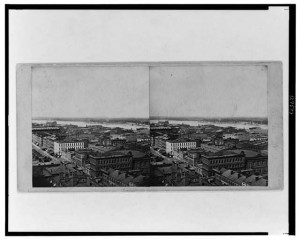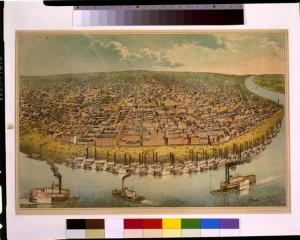Isn’t the telegraph great?. People in New York can read news from St. Louis as quickly as from Gotham itself. Missouri, a border state, is more divided than other states. The Union Provost-Marshall General wants to monitor newspapers throughout the state. The Baptist and Methodist churches split up long before the Civil War over the question of slavery. Here even the St. Louis Chamber of Commerce is splitting up.
From The New-York Times January 10, 1862:
IMPORTANT FROM MISSOURI.; Copies of all Newspapers Published in the State to be sent to the Provost Marshal General-Disruption of the St. Louis Chamber of Commerce.
ST. LOUIS, Thursday, Jan. 9.
The Provost-Marshal General has issued an order requiring all publishers of newspapers in the State of Missouri, St. Louis city papers excepted, to furnish him a copy of each issue for inspection; a failure with which order will render the paper liable to suppression.
Great excitement occurred in the Chamber of Commerce this afternoon, on the occasion of the election of officers, which resulted in the disruption of the Chamber, by the withdrawal of the Union members, who subsequently established a Union Chamber of Commerce, which will be immediately carried out. The trouble occurred in consequence of the secession members refusing, by their votes, to admit a number of Union applicants for membership.
As you can read at Ozarks Civil War Bernard G. Farrar was aide-de-camp to Nathaniel Lyon. On August 10, 1861 Farrar
… was appointed provost-marshal-general of the Department of the Missouri.
As provost-marshal-general, Farrar was responsible for ensuring that military orders were executed and handled legal matters pertaining to the army. On August 7, 1862, General Henry Halleck extended Farrar’s authority to include the states of Illinois and Iowa.
In December 1862 Farrar left his job as Provost Marshal General and became commander of the 13th Missouri Infantry. He took part in the siege of Vicksburg and served throughout the Civil War.


